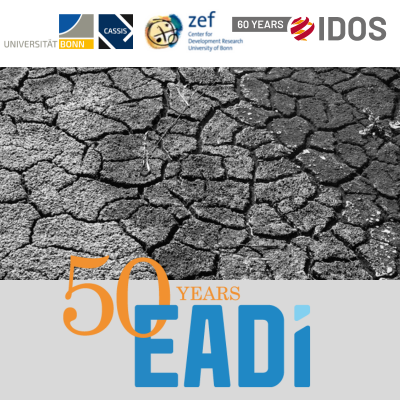What Triggers Extreme Food Insecurity? A Causal Analysis of Climate Hazards, Conflicts, and Famines in Somalia, 03 July 2024
Bonn and online, 14.00-16.00 CEST
Venue: Genscherallee 3, 53113 Bonn - The event will be held as a hybrid format - prior registration is requested.
Register here
Few countries in the world are more affected by food insecurity than Somalia. The country in the Horn of Africa is considered a "failed state" and is one of the poorest societies in Africa. Reliable data from Somalia is scarce, but the United Nations World Food Program estimates that more than four million people are starving.
The reasons for the hunger are complex. In addition to political instability and armed conflicts, Somalia is located in a region of the world that is particularly threatened by climate change. Climate shocks affect local ecosystems. In the form of droughts and floods, they destroy harvests and thus the livelihoods of millions of people
Special scientific methods are needed to make the problems in a country like Somalia measurable at all. For example, the use of georeferenced data or the Integrated Food Security Phase Classification (IPC) can provide important information about the extent and distribution of food shortages.
In his presentation, Dr. Sergio Tezanos, Professor at the University of Cantabria and CASSIS Fellow, will highlight the applications of these methods and the wider context of the situation in Somalia. Afterwards, Dr. Heike Baumüller from the Center for Development Research and Dr. Tekalign Sakketa from the German Institute of Development and Sustainability will join the discussion.
Welcome Remarks:
Susanne von Itter, Executive Secretary, EADI
Dr. Rogelio Madrueño, Research Fellow, CASSIS
Lecture:
Dr. Sergio Tezanos, Associate Fellow, CASSIS & Associated Professor, Universidad de Cantabrio
Discussion:
Dr. Heike Bauchmüller, Center for Development Research (ZEF)
Dr. Tegalign Sakketa, German Institute of Development and Sustainability
The event is being held in cooperation with the Center for Advanced Security, Strategic and Integration Studies (CASSIS) and the Center for Development Research (ZEF) at the University of Bonn and the German Institute of Development and Sustainability (IDOS)


